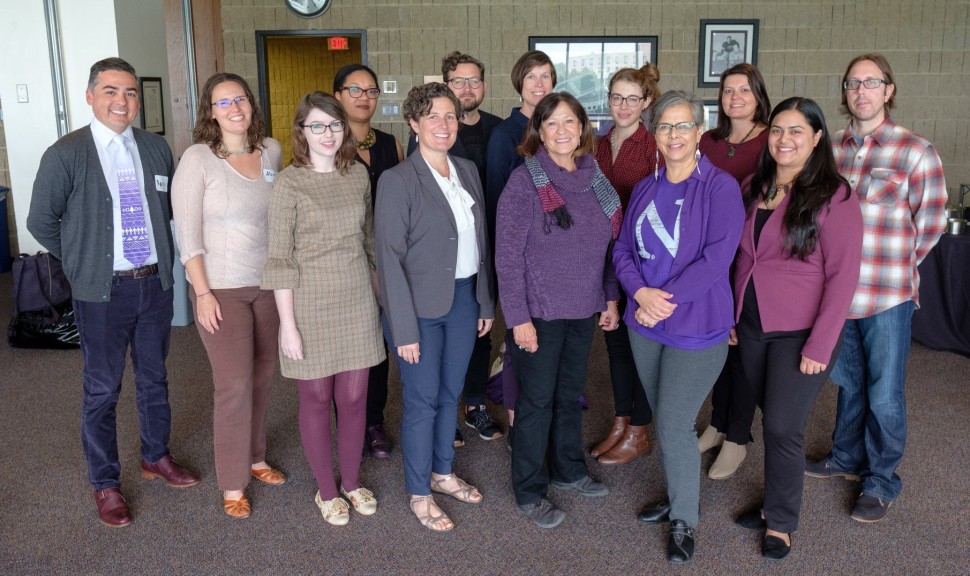Native American initiatives have gained new momentum at Northwestern University over the past year as the Center for Native American and Indigenous Research (CNAIR) expands its work and announces new fellowships for the 2018-2019 academic year.
The graduate fellowships seek to generate research that is relevant to Native communities and organizations. Fellows will receive faculty mentoring, present work, attend talks and develop an awareness of career possibilities within the field of Native American and Indigenous Research (NAIS). Graduate students from all disciplines, including the humanities, social sciences, science and engineering, business, law and medicine are encouraged to apply by November 15.
The undergraduate fellowships will offer students funding for a quarter-long research project, faculty mentoring and a stipend. Applications are open and fellowships are awarded on a rolling basis. Students from all disciplines are encouraged to apply.
“CNAIR is Northwestern’s primary vehicle for advancing the scholarship, teaching, learning and artistic and cultural practices of Native American and Indigenous communities,” said Patty Loew, co-director of the Center and professor at the Medill School of Journalism, Media, Integrated Marketing Communications
The interdisciplinary Center is co-directed by Kelly Wisecup, associate professor of English, and is based at the Weinberg College of Arts and Sciences.
Previously, the Center funded the work of two students who worked with professor Loew on a National Park Service research project. The project involved tribal teens who interviewed elders about traditional Ojibwe activities in the Apostle Islands National Lakeshore.
The new momentum comes on the heels of a series of recommendations by Northwestern University’s Native American Outreach and Inclusion Task Force. The recommendations aim at strengthening Northwestern’s relationship with Native American communities through recruitment efforts, academic programs and campus support services.
“The way that the Northwestern community has encouraged, supported and collaborated with the new center has been very encouraging. I am excited by this progress and for what it suggests for the future,” Northwestern University Provost Jonathan Holloway said.
“Already, CNAIR’s goal of supporting research that is meaningful and relevant to Native communities is moving forward.”
New graduate cluster
In 2017, The Graduate School approved the Native American and Indigenous Studies Graduate Cluster. The cluster exists to create opportunities and training in Native American and Indigenous Studies through invited speakers, yearly themes, professionalization workshops, mentoring and symposia.
Five students participated in the cluster in 2017-2018. Two of them went on to tenure track jobs last year: Bethany Hughes, a cultural historian and theatre scholar, went on to teach at the University of Michigan. And Chad Infante, who works at the intersection of Native Studies and African American Studies, went on to teach at the University of Maryland.
Inside and outside the classroom
CNAIR established fruitful collaborations in the classroom. In September 2017, undergraduate students studying race and indigeneity spent eight days in Hawaii as part of a hands-on learning experience co-funded by CNAIR. They explored indigenous Hawaiian culture and engaged with academics, activists and cultural practitioners.
“Our trip to Hawaii reminded me to engage more consciously with the world, centering relationships between people, places and things and asking questions about the history and purpose of tasks and objects,” said Anna DiStefano, one of the participants.
In the fall of 2017, poet and filmmaker Heid E. Erdrich delivered a series or poetry readings and performances as the Center’s inaugural artist-in-residence.
Looking ahead
On November 29, Indigenous sovereignty will be the focus of a symposium hosted by CNAIR, the Colloquium on Indigeneity and Native American Studies and the Kaplan Institute for the Humanities. Three scholars will lead the discussion; Jenny Davis (University of Illinois, Urbana-Champaign), Doug Kiel (Northwestern) and J. Kēhaulani Kauanui (Wesleyan University).
Undergraduate journalism students will get to create an indigenous tour of the Northwestern campus as part of a new class in 2019. “Media History: Native Northwestern” will be taught by Loew and will have students conduct oral interviews, look at newspaper accounts as well government reports as they explore the people and events that shaped Northwestern’s history.
On February 15, 2019, CNAIR and the American Indian Center of Chicago will co-host a panel discussing Chicago as a hub for Native art and activism. Laura Furlan (University of Massachusetts-Amherst) and Kiara Vigil (Amherst College) will lead the discussion.
At the 2018 Commencement ceremony, Northwestern Chaplain Rev. Tim Stevens acknowledged publicly for the University for first time that the Evanston campus sits on the traditional Native American homelands.
“As we gather today in celebration, we acknowledge that the Northwestern campus sits on the traditional homelands of the people of the Council of the Three Fires- the Ojibwe, Potawatomi, and Odawa as well as the Menominee, Ho-Chunk and Miami tribes,” Stevens said.
“It is also a site of trade, travel, gathering and healing for more than a dozen other Native tribes and the State of Illinois is still home to more than 100,000 tribal members,” Stevens said. And so let us honor the people who have called this place home and be mindful of how our presence is situated within that history.”


